About TBI
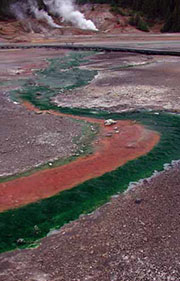
Established in 1999, the Thermal Biology Institute is a multidisciplinary team of
scientists forging a new path in scientific discovery focused on the unique thermal environments
within Yellowstone National Park. TBI is currently composed of fifteen faculty representing
expertise in biochemistry, geochemistry, microbiology, virology, mycology, ecology,
plant physiology, and environmental physics. In addition to an emphasis on multidisciplinary
research, TBI promotes interdisciplinary learning through a strong educational component
that incorporates undergraduate, graduate, and post-doctoral training.
TBI faculty comprise an impressive list of renowned researchers who have collectively
garnered over $20 million in competitive research funding for MSU in the past 8 years,
including the recent NSF-funded $1.8 million remodel of TBI headquarters on the sixth
floor of Leon Johnson Hall. A brief list of influential and relevant research currently
conducted by TBI investigators and their students include the archaeal viral ecology
work of Mark Young, microbial mat community work of David Ward, the novel biofuels
and alternative energy work of Brent Peyton and Robin Gerlach, YNP geomicrobiology
work of Matthew Fields, unique work on mercury transformation in hot springs by Gill
Geesey, multi-site genome sequencing lead by William Inskeep and Tim McDermott, and
the computer simulation of hot springs microbial metabolisms by Ross Carlson.
TBI faculty represent some of the best researchers in biochemistry, geochemistry,
microbiology, virology, ecology, chemistry, biochemistry, earth science, engineering,
environmental science, and plant sciences. Our faculty members are extremely productive
and have utilized TBI research funds to leverage additional support from a variety
of competitive grant programs including NASA, National Institutes of Health, National
Science Foundation, Department of Energy, and the Department of Defense.
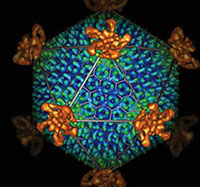
TBI faculty have numerous publications in top journals, including several influential papers in Science and the Proceedings of the National Academy of Sciences. The work of TBI investigators has been featured on the cover of the journals Science, the Proceedings of the National Academy of Sciences, and the Journal of Virology. TBI faculty have been recipients of national awards and invited speakers at numerous local, national and international meetings, and have been featured in local and national newspaper articles, television documentaries, and national magazines.
The long-term goal of TBI is to understand how organisms respond and adapt to the unique physical and chemical features of geothermal environments. We are committed to furthering scientific understandings of the extreme limits of life on our planet, and working to ensure a sustainable future for research and outreach focused on the geothermal features of Yellowstone National Park.
Featured Researchers
Brent Peyton
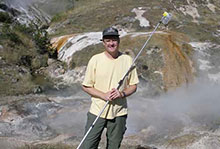 Director, Thermal Biology Institute and a member of the Executive Committee of the
NSF Center for Biofilm Engineering at Montana State University. His areas of expertise
are applied research in extremophile bioprocesses, renewable biofuel production, and
heavy metal bio-transformations. Peyton’s industrial research contributions have been
funded by a variety of companies from local small businesses to Fortune 500 home and
health care companies in areas ranging from renewable biofuels and extremophile biofilm
contamination to microbial heavy metal removal. Peyton is a member of an interdisciplinary
team that recently developed a chemical trigger to significantly increase the production
rate and yield of algal lipids – a key feedstock for renewable algal biodiesel. A
patent has been submitted and the technology is being licensed by a well-known chemical
manufacturer.
Director, Thermal Biology Institute and a member of the Executive Committee of the
NSF Center for Biofilm Engineering at Montana State University. His areas of expertise
are applied research in extremophile bioprocesses, renewable biofuel production, and
heavy metal bio-transformations. Peyton’s industrial research contributions have been
funded by a variety of companies from local small businesses to Fortune 500 home and
health care companies in areas ranging from renewable biofuels and extremophile biofilm
contamination to microbial heavy metal removal. Peyton is a member of an interdisciplinary
team that recently developed a chemical trigger to significantly increase the production
rate and yield of algal lipids – a key feedstock for renewable algal biodiesel. A
patent has been submitted and the technology is being licensed by a well-known chemical
manufacturer.Valérie Copié
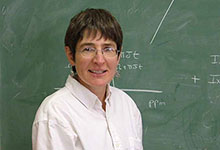 Valérie Copié is director of the high field NMR Metabolomics Research Facility which is located
in the Department of Chemistry and Biochemistry at Montana State University. The research
program of the Copié lab focuses on the investigations of protein structure and function
(structural biology) and is expanding into metabolomics research, which involves the
identification and quantification of small molecules metabolites as diagnostic markers
of cellular phenotypes. Copié’s collaborative approach with the Bothner laboratory
combines NMR, mass spectrometry (MS), and a variety of other biophysical techniques
including small molecules metabolites extractions, protein biochemistry, circular
dichroism, molecular biology, site-directed mutagenesis, and in vitro structure-function
protein assays.
Valérie Copié is director of the high field NMR Metabolomics Research Facility which is located
in the Department of Chemistry and Biochemistry at Montana State University. The research
program of the Copié lab focuses on the investigations of protein structure and function
(structural biology) and is expanding into metabolomics research, which involves the
identification and quantification of small molecules metabolites as diagnostic markers
of cellular phenotypes. Copié’s collaborative approach with the Bothner laboratory
combines NMR, mass spectrometry (MS), and a variety of other biophysical techniques
including small molecules metabolites extractions, protein biochemistry, circular
dichroism, molecular biology, site-directed mutagenesis, and in vitro structure-function
protein assays.
Ross Carlson
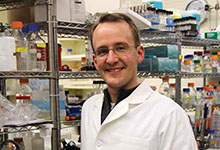
Ross Carlson is a professor in the Department of Chemical and Biological Engineering as well as a member of the Center for Biofilm Engineering .His areas of research expertise include in silico metabolic systems analysis, synthetic biology/ metabolic engineering and the production of biofuels from renewable resources .The Carlson laboratory is utilizing a systems biology approach known as elementary flux mode analysis to study the properties of microbial reaction networks. The network analysis research is integrated into practical microbial engineering and microbial physiology studies to engineer useful bioprocesses. Applications of this work include environmentally critical processes like efficient nutrient recycling and bioremediation of contaminated sites. The research can also be used to optimize biotechnological processes like the production of biofuels and biomaterials from renewable resources. In addition by advancing our metabolic understanding of microbial pathogens, it should be possible to improve prevention and treatment strategies for medical infections.
